Posts Tagged ‘Burma Partnership’ (399 found)
Daw Aung San Suu Kyi Works To Make Reconciliation in Burma a Reality
In the month following her release from more than 15 years of unjust captivity over the last 21 years, Daw Aung San Suu Kyi has demonstrated through words and actions why she continues to be a powerful force for social and political progress. While the State Peace and Development Council (SPDC) has maintained its authoritarian command to gain greater personal profit and perpetual military rule, Daw Aung San Suu Kyi has displayed even handed leadership in the nation’s struggle for democracy, ethnic equality and inclusive development. Daw Aung San Suu Kyi’s efforts not only underscore the flaws of the SPDC’s unilateral “Roadmap to Democracy,” but also illuminate a real path towards national reconciliation […]
• • •Civilians in Danger as Election-Related Armed Conflict Continues in Eastern Burma
Since Burma’s fraudulent elections on 7 November, Thailand has seen the largest influx of civilians from Burma fleeing into the country in more than a decade. On 8 November alone, 25,000 civilians fled from fighting in the town of Myawaddy and another 10,000 crossed from Three Pagoda Pass. In the weeks following the initial outbreak of violence, the armed conflict, along with flows of fleeing civilians, has continued. The volatile situation illustrates the damage done by the SPDC’s authoritarian process to entrench military rule through their “Roadmap to Democracy” and their failure to facilitate genuine national reconciliation. Just as democratization in Burma requires global support, a collective, international effort is needed to ensure the protection of civilians under threat in Eastern Burma […]
• • •Neither Free Nor Fair: Burma’s Predetermined Elections
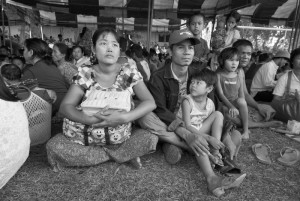 Burma’s elections yesterday were marked by fraudulent activities, a notably low voter turnout, and an overall skepticism that these polls would bring any real change to people’s lives. Despite crippling media restrictions and a ban on international election monitors in Burma, over the course of the last two days there has been substantial and mounting evidence of significant elections-related violations emerging from the country. While these violations undermine the credibility of the elections, they have not been unexpected based on the pre-election conditions. Long before election day, it was evident that the military regime had failed to create the necessary conditions for these elections to accurately represent the will of the people […]
Burma’s elections yesterday were marked by fraudulent activities, a notably low voter turnout, and an overall skepticism that these polls would bring any real change to people’s lives. Despite crippling media restrictions and a ban on international election monitors in Burma, over the course of the last two days there has been substantial and mounting evidence of significant elections-related violations emerging from the country. While these violations undermine the credibility of the elections, they have not been unexpected based on the pre-election conditions. Long before election day, it was evident that the military regime had failed to create the necessary conditions for these elections to accurately represent the will of the people […]
Burma’s Election Day Marked by Fraud and Low Voter Turnout
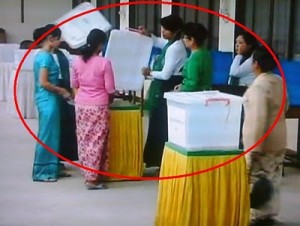 Despite crippling media restrictions and a ban on international election monitors in Burma, over the course of the day there has been substantial and mounting evidence of significant elections-related violations emerging from the country.
Despite crippling media restrictions and a ban on international election monitors in Burma, over the course of the day there has been substantial and mounting evidence of significant elections-related violations emerging from the country.
Violations reported by media, citizens inside Burma, and inside networks include accusations of ballot stuffing, unsecure ballot boxes, flawed voter lists, lack of secret voting processes, and illegal campaigning. Many voters were also told how to vote by polling station staff or had their ballots cast in their name . Members of the junta-backed Union Solidarity and Development Party (USDP) interfered in many polling stations, taking on roles and responsibilities prohibited in the election laws […]
Election Day Has Arrived: Burma Election Tracker Online!
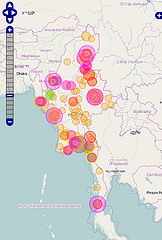 Today, on the day of elections, we invite you to join us in tracking the elections through personal interviews, media articles and citizen reports documented on the website. Together, we can follow the elections, and see the developments as they occur over the next few weeks.
Today, on the day of elections, we invite you to join us in tracking the elections through personal interviews, media articles and citizen reports documented on the website. Together, we can follow the elections, and see the developments as they occur over the next few weeks.
The information gathered on this site is a testament to the will of the Burma’s democracy and human rights activist networks inside and outside the country – given the military’s draconian restrictions on reporting and freedom of speech, what is remarkable is the fact that these personal stories have even been able to make its way out of the country. The reports are thanks to a vast network of media reporters, activists, citizens in Burma, migrants, and Burma’s diaspora […]
Security Tightened in Rangoon on Eve of Sunday Election
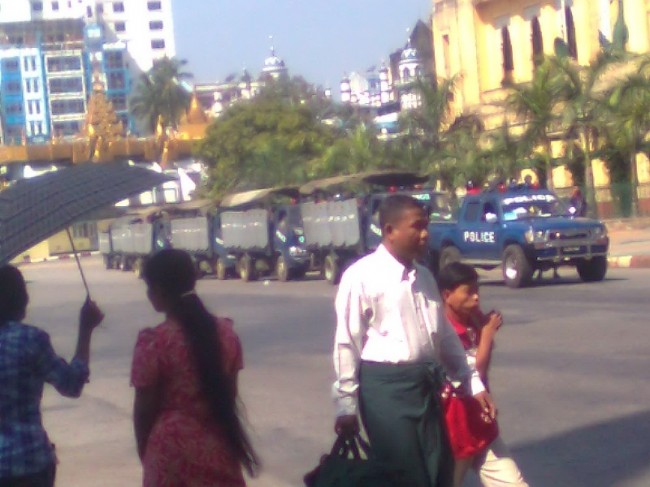 The day before the elections, the State Peace and Development Council (SPDC) has stepped up the security in Burma. Since the morning of 6 November, police presence increased in Rangoon, in front of City Hall downtown as well as in the outlying residential areas. By 9pm, the streets were quiet again. See more photos here.
The day before the elections, the State Peace and Development Council (SPDC) has stepped up the security in Burma. Since the morning of 6 November, police presence increased in Rangoon, in front of City Hall downtown as well as in the outlying residential areas. By 9pm, the streets were quiet again. See more photos here.
Kalay Declaration: Ethnic and Democratic Leaders Inside Burma Working for a Unified National Reconciliation Conference
Recently a significant grouping of ethnic, democratic, and student and youth leaders proposed a plan that could potentially lead to an end of Burma’s political stalemate. Known as the Kalay Declaration, this pact has been gathering momentum and support from important political and ethnic leaders, and veteran politicians from across Burma.
On October 24th, the Zomi National Congress (ZNC), a 1990 election winning party, met in Kalay Township, Sagaing Division, for their 22nd anniversary. The Zomi are an ethnic group in western Burma and the ZNC are known for being very strong and active in working to promote democracy. They came together with other democratic leaders in the country, and collectively made a declaration of commitment to begin a consultative dialogue towards the creation of a federal union, or as they also put it, a 2nd Panglong Agreement […]
• • •Key Stakeholders Explore the Reality on the Ground of Burma’s Military Elections
Speakers representing central stakeholders in Burma spoke today about how the elections next Sunday will not improve the situation on the ground in Burma. They spoke about the junta-backed Union Solidarity and Development Party’s (USDP) manipulation of the polls, the National League for Democracy’s ongoing efforts for genuine democracy, escalating attacks against ethnic nationalities and the resistance of students and youths against the upcoming elections […]
• • •Monks’ Ongoing Resistance Against the Burma’s Military Regime
Riot police and security forces were on high alert in Rangoon this week after monks and activists issued a statement that they would be organizing protests against the 7 November elections. At least 2 monks were detained at the Shwedagon Pagoda for handing out pamphlets saying they do not accept the elections or the regime’s new flag.
Saturday marked the end of Buddhist Lent, an important religious event. On this day, temples and pagodas throughout the country hold alms donation ceremonies and are attended by millions of people. At Thayettaw Monastery in Rangoon, authorities stopped alms donations to monks […]
• • •“This is Not Democracy” – New Short Film About the 2010 Elections
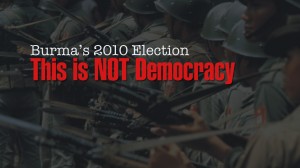 Burma Partnership, in collaboration with Kestrel Media, is releasing today a 17-minute film that shows why the people of Burma do not believe that the upcoming elections will bring any genuine democratic progress to their country.
Burma Partnership, in collaboration with Kestrel Media, is releasing today a 17-minute film that shows why the people of Burma do not believe that the upcoming elections will bring any genuine democratic progress to their country.
“This is Not Democracy” examines the historical context of the current elections, illustrating how the military regime’s so-called “Roadmap to Democracy”, including the 2008 Constitution, is nothing more than an attempt to cement military rule under a civilian façade […]
• • •








 All posts
All posts